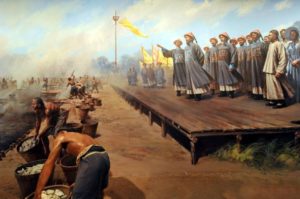1839 Commissioner Lin destroys the opium
In the early 19th century the Qing dynasty ruling China was trying to keep foreigners at bay and closely regulate trade with the outside world. This policy resulted in a balance of payments problem for the British who imported far more Chinese goods than the value of what they could, with difficulty, sell the Chinese. In response to this, the British East India Company hit on the diabolical scheme of smuggling opium into southern China, a technique that soon created a widespread addiction problem among the Chinese and a profitable harvest of silver for the British.
To remedy this, Emperor Daoguang sent Lin Zexu as a specially appointed imperial commissioner to end the practice of the opium trade. To stamp out opium, Commissioner Lin used all the powers of the Chinese state: he instituted a public-health program warning of the dangers of addiction; he organized addicts into five-man mutual-responsibility teams pledged to guarantee that no one in the group would smoke; he rewarded those informing on the drug pushers; he arrested dealers and seized their wares — tons of opium and tens of thousands of pipes.
He moved diplomatically with the foreigners behind the trade, not wishing to start a war he could not win, urging them to stick to their legitimate trade in tea, silk, and rhubarb (he believed this last to be essential to the health of foreigners) and to desist from harming the Chinese people. In a carefully phrased letter to Queen Victoria, Lin tried to appeal to her moral sense of responsibility. “We have heard that in your honorable nation, too,” wrote Lin, “the people are not permitted to smoke the drug, and that offenders in this particular expose themselves to sure punishment…. In order to remove the source of the evil thoroughly, would it not be better to prohibit its sale and manufacture rather than merely prohibit its consumption?” Opium in fact was not prohibited in Britain and was taken— often in the form of laudanum—by several well-known figures, Samuel Taylor Coleridge among them. Many Englishmen regarded opium as less harmful than alcohol, and Lin’s moral exhortations fell on deaf ears.
When the British in Canton refused to give up their opium, or to hand over only token amounts, he blockaded their compound. After six weeks, when the foreigners had agreed to give up over 20,000 chests of opium and Commissioner Lin had taken delivery, the blockade was lifted. Lin was now faced with the remarkable challenge of destroying close to 3 million pounds of raw opium. His solution was to order the digging of three huge trenches, 7 feet deep and 150 feet long. Thereafter, five hundred laborers, supervised by sixty officials, broke up the large balls of raw opium and mixed them with water, salt, and lime until the opium dissolved. Then, as large crowds of Chinese and foreigners looked on, the murky mixture was flushed out into a neighboring creek, and so reached the sea.
In a special prayer on June 3, 1839, to the spirit of the Southern Sea, “you who wash away all stains and cleanse all impurities,” Lin brooded over the fact that “poison has been allowed to creep in unchecked till at last barbarian smoke fills the market.” He apologized to the spirit for filling its domain with this noxious mixture and, he wrote in his diary, advised it “to tell the creatures of the water to move away for a time, to avoid being contaminated.” As to the foreigners who had lived through the blockade and now watched the solemn proceedings, Lin wrote in a memorial to Emperor Daoguang, they “do not dare show any disrespect, and indeed I should judge from their attitudes that they have the decency to feel heartily ashamed.”
On the contrary, the shameless British appealed to their government who used Lin’s actions as a pretext for the start of the Opium Wars that blasted the doors open to Chinese trade.
